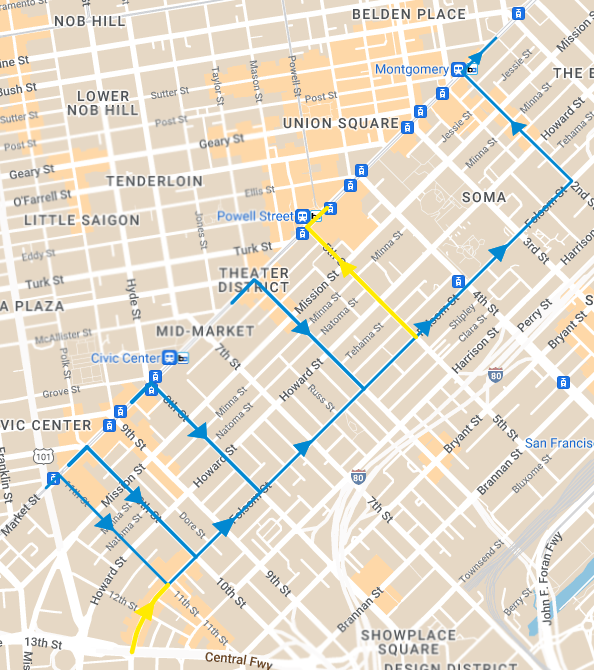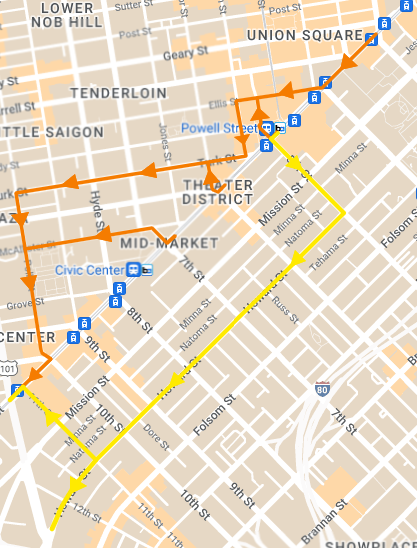The San Francisco Bicycle Coalition transforms our streets and neighborhoods into safe, just, and livable places by promoting the bicycle for everyday transportation. We’re seeking a passionate, highly motivated individual to power this crucial work by supporting the organization’s bicycle education program. The San Francisco Bicycle Coalition’s Bicycle Education Coordinator leads and shapes our Bicycle Education program, reflecting our core values of Transportation Justice, Sustainability, People Power and Joy.
The San Francisco Bicycle Coalition partners with government agencies and private companies to provide free, multilingual bicycle education for San Franciscans of all experience levels. Our bicycle education programming lives out our core values by breaking down barriers that folks may face to bicycling. We offer around 50 adult classes annually, and teach nearly 1,000 adults each year; learn more about the classes we offer here.
The Bicycle Education Coordinator oversees fulfillment of education contracts with the SF Municipal Transportation Agency (SFMTA) and micro-mobility companies, and seeks additional opportunities to present high-quality, culturally competent, multilingual bike education throughout the city. This position reports to the Director of Community Programs and collaborates with a dynamic Community Programs Team focused on our Bike It Forward program, and valet bicycle parking, and will coordinate a part-time staff of 15+ Bicycle Education Instructors.
Commitment to Equity and Justice
The San Francisco Bicycle Coalition acknowledges the harm that biking culture and unequal access to transportation have inflicted upon underserved communities — especially people of color, people with disabilities, people from working-class backgrounds, women, and people with LGBTQ+ identities. We believe that these communities must be centered as leaders in the work we do; therefore, we strongly encourage applications from people with these identities.
APPLY HERE
Primary responsibilities include:
- Act as content expert on all matters of mobility education, providing vision to the Bicycle Education programming and ensuring that the program’s work aligns with the organization’s mission, strategic plan, and goals, especially regarding equity, accessibility, and cultural competency and responsiveness;
- Execute multiple education contracts (with the SFMTA, bike share companies, Golden Gate Transit and others) to ensure deliverables are met on time and within budget, as well as solicit feedback, testimonials, and track data related to contracts;
- Craft curriculum to ensure high-quality bicycle safety education classes are available for adult bike riders and professional drivers, emphasizing equity and cultural competency. Update curricula regularly to conform to the California Vehicle Code, local regulations, and emerging infrastructure and mobility trends;
- Coordinate a team of 15+ part-time, multilingual bicycle educators, including scheduling instructors and providing training and feedback;
- Work with the Director of Community Programs to solicit and secure contracts with private companies and public agencies to expand bicycle education training and professional driver training, including renewal and extension of existing bicycle education contracts;
- Generate revenue for the organization through a variety of fee-for-service educational opportunities (such as in-office trainings).
- Build relationships with community-based organizations that serve low-income, non-English speaking, and BIPOC communities, and;
- Collaborate within the Programs team and across departments to augment the work of each department and best serve community needs, and to effectively promote and market classes and communicate the stories of success that emerge from our education programs.
Strong candidates will possess as many of the following qualifications as possible:
We recognize that this position encompasses a number of different responsibility areas. We are committed to training and supporting our staff to strengthen their abilities in each area and we encourage applications from people who may not have all of the qualifications listed below.
- One year of experience in program coordination or education work (bicycle education is a plus);
- Experience fulfilling contracts in either the private or public sector, including meeting deliverables and reporting on successes and areas for growth;
- Direct experience building strong partnerships with public agencies and community-based organizations, particularly those serving underserved communities;
- Successful project planning and strategy implementation;
- Excellent communication skills;
- Ability to both operate independently and collaborate internally with other programs and other departments;
- Experience with databases or client relationship management (CRM) systems (experience in Salesforce a plus);
Salary and Benefits: The annual salary for this exempt position is $60,000-$69,000 depending on depth of experience. Full-time benefits include excellent medical, vision and dental insurance with no employee contribution, as well as a year-long four-day workweek pilot, three weeks of paid time off (increasing with tenure), ten days of sick leave, pre-tax transit benefits, and a flexible work arrangement policy.
Hours: Full-time, exempt
Reports to: Director of Community Programs
Location: Hybrid — San Francisco Bay Area. Staff and their supervisors will work together to determine the appropriate work arrangement based on the nature of the individual’s role, and in alignment with organizational policies and departmental needs and activities. We strive to be as flexible and fair as possible while ensuring in-person accessibility when needed to interface with our volunteers, membership, community, and each other.
APPLY HERE
To apply, please submit a resume and a PDF with your answers to the below three questions. Please make your answers roughly one paragraph each:
1. What inspires you to want to work at the San Francisco Bicycle Coalition?
2. What does transportation justice mean to you and how do you see it fitting into your career?
3. What skills and/or experiences do you have that would make you a good fit for this role?
About the San Francisco Bicycle CoalitionThe San Francisco Bicycle Coalition works to transform San Francisco’s streets and neighborhoods into safe, just and livable places by promoting the bicycle for everyday transportation. Our work is guided by our five-year strategic plan and the core values of Transportation Justice, Sustainability, People Power and Joy. The organization’s culture reflects its grassroots origins and professional advocacy in equal measures. Our active membership represents San Franciscans of all ages and backgrounds from all neighborhoods who are working towards safe, sustainable and more affordable ways to move around our city. The SF Bicycle Coalition is the largest city-based bicycle advocacy group in the nation and one of the largest member-driven groups in San Francisco. The San Francisco Bicycle Coalition is an equal opportunity employer. Our commitment to transportation justice includes acknowledging that society’s bad behavior disproportionately hurts the most marginalized people in society — including people of color, people from working class backgrounds, women and LGBTQ+ people. We believe that these communities must be centered in the work we do. Hence, we strongly encourage applications from people with these identities.



